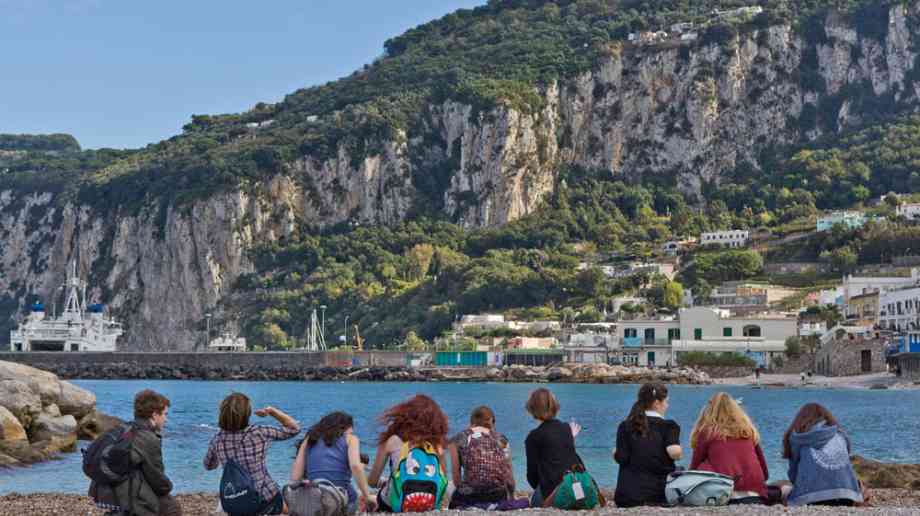
What makes educational school trips successful?
The summer blockades in Calais caused major disruption at a peak time in the school trip calendar, leading to disappointment, cost and frustration for pupils, teachers and parents across the UK. A major school trip, which would have seen children performing music at the Menin Gate in Ypres, was cancelled because of the delays en route and the fact that a return time couldn’t be guaranteed. This was just one example. Aside from the millions of pounds the illegal strikes cost the school trip industry, one positive point that came from the issue was the spotlight it placed on the benefits of choosing to travel with an accredited tour operator of The School Travel Forum (STF).
These companies, which manage over 16,000 school trips from the UK each year, were able to guide groups and teachers through any problems that they may have experienced as a result of not being able to cross the Channel on the expected date.
Another example highlights the difficulties of a Year 6 trip to France booked by Harrogate Grammar School which was widely covered in the media, with Good Morning Britain describing their experience as ‘the unluckiest school trip ever’. Despite the disruption to the trip caused by the wild cat strikes in Calais, the school praised their school trip provider, an STF member, for their support during the experience which ranged from sourcing alternative accommodation in the UK, to additional on coach catering and assistance in arranging theme park tickets to end the trip on a positive note.
This STF member worked round the clock with the teachers and the school to minimise the disruption of the unpredictable events and illustrated how having assured support procedures in place, a wealth of experience and industry contacts can provide vital reassurance and the best possible outcome for school trips facing adverse events.
Raising educational standards?
Often quoted but still an important piece of research, Ofsted published a thematic report on Learning Outside the Classroom (LOtC) in October 2008. Its key findings found that: “When planned and implemented well, learning outside the classroom contributed significantly to raising standards and improving pupils personal, social and emotional development.”
It recommended that schools and colleges should: “Ensure that their curriculum planning includes sufficient well‑structured opportunities for all learners to engage in learning outside the classroom as a key, integrated element of their experience.”
More recent evidence in support of the 2008 Ofsted findings was highlighted in the ‘What Works’ document produced by the Cabinet Office that stressed the work of the six ‘What Works’ centres across the country. A recent Educational Endowment Foundation trial stated: “Pupils that went on school trips were taught a structured approach to improving their writing using the trip as a source of inspiration. The pupils who received this intervention made an average of one months progress compared to the control group.”
Further work looking at the impact of residential experiences on pupil attainment has been undertaken through the Paul Hamlyn Foundation Learning Away programme. Their findings from the evaluation to date are stated as: “Clearly showing that students, staff, parents and schools valued learning away residentials. The evidence continues to show that many positive impacts seen on residentials, for example the development of relationship, confidence and engagement with learning, as well as the delivery of learning, were also sustained back at school.”
In 2013 the University of Hull undertook a study analysing the impact of a simple child led, field based learning task on children’s scientific knowledge and literacy skills. It revealed that: “On average children who had undertaken the fieldwork activity achieved higher literacy scores than children that did not.”
Finally, the Teaching and Learning Research Programme which ran from 2000 to 2011 was the UK Economic and Social Research Council’s largest investment in educational research. It concluded in 2008 with one of its ten principles for effective teaching and learning being that: “Informal learning, such as learning out of school, should be recognised as at least as significant as formal learning and should therefore be valued and appropriately utilised in formal processes.”
Is it just about the kids?
The same Learning Away research mentioned above was also able to evidence the impact residentials have on school and staff development. When considering how residentials transform schools they concluded: “When residential experiences are integrated with the curriculum, are inclusive, progressive and involve staff and students in planning and following up, the sense of cohesion and of belonging to a community is enhanced throughout the whole school. This change can impact on the classroom, year group, and school life as a whole.”
In the evaluation of the Learning Away case studies, Maggie Rose, head teacher at Timberley Academy quotes about the development of her staff: “Staff have developed a much greater confidence in their own teaching and it has also raised their aspiration in terms of the types of approaches they could use in their work. I see it in their planning and in the classroom – an example is the use of film. I see this being used in class very cleverly and far more often by pupils and staff. We have changed our whole approach to the school curriculum and the staff have developed the confidence to go with this and contribute to its vision of development.”
Outdoors or indoors?
Often the first thoughts about school trips are children working in and experiencing the outdoors, be it field studies, geography field trips or outdoor and adventurous activities. Many great experiences are associated with the natural environment and there is a wide range of well-researched and vocal support for incorporating opportunities such as these into the school life of all pupils.
But these are not the entirety of learning opportunities; the concept of LOtC not only includes the outdoors, but equally includes what might be described as ‘learning inside, but elsewhere’. The extra impact added to religious study that takes place in mosques and churches is a good example.
Equally, LOtC encapsulates ‘learning in new and different places’, which literally could include the whole world. Think about the greater understanding of the effects of WW1 that would come from integrating a visit to the Battlefields into the study of the subject in school, or the beneficial effect of language immersion, that is only really possible by visiting other countries. Consequently, the opportunity to enhance learning with trips out is considerable.
The Loyalty Factor
On a broader point, the psychology of the purchasing process is an interesting one. Whatever we choose to buy, trust of the vendor is a major factor, but also where we have shopped before, word of mouth recommendation and how appealing the marketing spiel is all influence our choices. Booking school trips is no different. Many schools opt to travel with the same provider they have used over the years, but does this loyalty-driven choice provide genuine reassurance that quality and safety standards have been adequately tested? The answer is often no, as previous use has proven to be no guarantee of future performance.
Furthermore, with the average school trip representing an investment of over £20,000, what happens if the company goes bankrupt? Parents who may have budgeted for months to give their child the opportunity of a lifetime, are left severely out of pocket and children have to deal with the disappointment and miss out on the learning value of the school trip.
All STF Assured Members are required to work so clients benefit from the protection of the Package Travel Regulations and additionally, they must be members of approved schemes ensuring fair trading and full financial security. The peace of mind this provides to teachers and parents is indeed priceless.
By making it easy for teachers to seek out good quality school trip companies, the red tape and health and safety concerns cited by many teachers and governors as reasons why they decide not to arrange school educational visits, become less of an issue.
Whilst the STF has been established since 2003, according to our surveys many teachers are still taking a DIY approach and failing to capitalise on the benefits of travelling with an assured member. Fortunately, there is a shift towards greater reliance and awareness of the organisation and also the LOtC Quality Badge, with 72 per cent of teachers surveyed in 2015 stating that STF membership would be either likely to influence or be an essential pre-requisite in their choice of school trip provider.
As the national awarding body of the LOtC Quality Badge, The School Travel Forum ensures that each holder has passed a robust assessment designed to ensure that they are meeting schools’ learning and risk management needs. This takes an immense amount of pressure off teachers, reduces planning time and paperwork and helps teachers to identify opportunities for learning to help make the visit a positive and rewarding experience for teachers and pupils alike.
Managing the What Ifs…
Whilst school trips are statistically one of the safest environments for children to be in, as with any journey or event in life, accidents and ill fortune can unfortunately strike. Whilst the chance of such events happening are small, it is certainly a worry for any school trip organiser.
The scenario of being overseas with up to 50 pupils and having to deal with an incident independently is an unsettling prospect for any school. With this in mind, it makes no sense for schools to shoulder this burden alone, especially when there is 24/7 support available from a specialist school travel provider who has the experience, contacts and emergency procedures in place to help to manage any circumstances.
With the School Travel Forum 2015 Survey of over 2,000 secondary school teachers showing that 22 per cent of school trip organisers are still opting to make their own travel arrangements and bypass the quality, safety and financial security benefits of travelling with an assured provider, going forward it is our role to win over those teachers who are still unaware of the technical and professional support that is at their disposal. With the school travel industry rapidly expanding, and new providers constantly entering the market, it has never been more important to make it easy for teachers to identify the companies offering reliable and regularly audited safety and quality standards.
Why take the risk of DIY?
With a prevailing and increasingly risk-averse culture in schools (as the headlines over banning leapfrog and conkers show) it poses the question why 22 per cent of school trip organisers have previously opted for the DIY approach when arranging school trips? As well as trying to minimise costs for parents, teachers often choose the same coach firms and accommodation the school has always used out of sense of familiarity, but previous use has proven to be no guarantee of future performance. Understandably, with greater complexity to manage the percentage drops to eight per cent for ski and sports tours, but all these organisers when surveyed are also those with very low knowledge of important regulations and beneficial approval schemes.
Protection
Travel booked as separate elements does not enjoy the financial protection of a package tour. Obviously, failure to deliver by the supplier is a major issue and redress against an overseas party is not easy at the best of times. Heading abroad also brings its own unique set of issues; whilst over 16,000 school trips are organised through STF Assured Members each year, all protected by the LOtC Quality Badge, schools choosing facilities outside of the scheme have minimum protection over standards. In the EU, hotel safety requirements remain just guidance, not a directive. Even close to home, hotel standards can vary widely and safety issues can arise from the actual day-to-day management of the hotel.
With the average school trip representing an investment of over £20,000, the protection of these funds, which are mostly paid for by parents, is an important consideration. All STF Assured Members benefit from the protection of the Package Travel Regulations and must be members of approved schemes ensuring fair trading and full financial security. This sort of insurance gives peace of mind not just to teachers but also to parents who whilst appreciating the chance to broaden their children’s horizons, might have made personal financial cutbacks to be able to fund their child’s trip.
Creating lasting memories
Educational visits are all about creating lifelong memories and if something goes wrong, be it an unaccredited company going out of business, fallout from inadequate health and safety standards, or experiencing below par activities of amenities, then these are certainly not the sort of memories that teachers, pupils or parents want to have. All STF Approved providers follow robust codes of practice and are regularly monitored by a team of inspectors. This means that teachers can rest assured that the venue and the activities meet the required standards.
A telling finding from the STF 2015 Awareness Survey, was that 95.5 per cent of the 2019 secondary school teachers surveyed viewed 24/7 emergency support whilst on tour as an essential or important requirement when booking a school trip. Whilst educational visits are statistically one of the safest environments for children to be in, the extra reassurance that emergency expert support is available round the clock is crucial to trip organisers, who after all want to have a positive and successful experience themselves.
What is encouraging is that awareness of the benefits that LOtC Accreditation and STF Approval can bring is growing amongst the people they stand to help – i.e. teachers and organisers and also the reputable school trip providers that deserve to grow within the market. In 2013, 58 per cent of teachers reported that STF Approval was either an essential prerequisite or likely to influence their decision when choosing a supplier.
Encouragingly this jumped to 72 per cent in this year’s survey, so the message about the reliability, ease and simplicity of travelling with accredited providers is getting through.
The School Travel Forum was founded in 2003 and is a not for profit organisation. Its Assured Member scheme has widespread recognition and support for the way it simplified and provided essential reassurance for leaders looking to organise school trips.
Founded by the government in 2008 and now an independent charity, the Council for Learning Outside the Classroom is the national voice for all types of LOtC.
Further Information
www.schooltravelforum.com
Latest News
19/12/2025 - 09:54
The Education Committee has expanded its ongoing inquiry into the early years sector to examine how safeguarding can be strengthened in early years settings.
18/12/2025 - 09:25
The UK will be rejoining the Erasmus programme in 2027, following a package of agreements with the EU.
17/12/2025 - 09:31
Ofqual has fined exam board Pearson more than £2 million in total for serious breaches in three separate cases between 2019 and 2023 which collectively affected tens of thousands of students.
16/12/2025 - 09:19
The average funding rates will increase by 4.3% for under 2s, and by almost 5% for 3-and-4-year-olds.
15/12/2025 - 10:30
Local colleges are set to receive £570 million in government funding to expand training facilities in areas such as construction and engineering.







